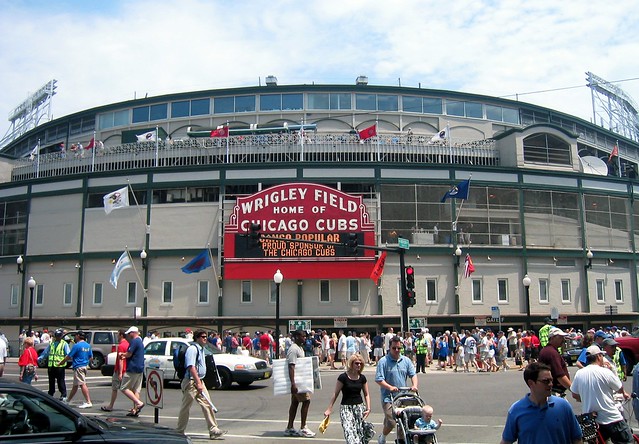The Cubs are expected to announce a deal with Alderman Tom Tunney of the 44th Ward later today that would add a large parking garage and a hotel to the area near Wrigley Field, as well as modifications to the stadium itself. The Chicago Tribune reported yesterday that "the Cubs have agreed to create extra parking in Wrigleyville" with up to 500 spaces on what is currently a gravel lot at Clark and Grace Streets.
Building a parking garage in this transit-accessible, walkable neighborhood is the wrong move. Instead of alleviating frustrations, it will only bring more car traffic to the area and make matters worse. Existing parking problems – a common complaint, for instance, is that residents cannot park in front of their homes because visiting drivers have violated the parking permit rules – are solvable without building an unsightly, anti-pedestrian, traffic-generating structure.
In fact, a garage will cause more problems than it solves, said civil engineer Ryan Wallace, who's also a Lakeview resident and Cubs fan. A 500-car parking garage won't just hold 500 cars that fans are already driving to Wrigleyville, he said. It will induce more car trips, since fans will know there's more parking available. "You're going to cause a greater amount of car trips than there are spaces to hold them," Wallace said.
Wallace said the real capacity problem that needs to be solved is on the sidewalk. There's not enough room for all the pedestrians trying to get to the stadium, who crowd the sidewalks alongside residents just trying to get home from the train stations. "People routinely spill over into the street," he said.
It's possible that the Cubs might add more than 500 parking spaces. Tunney's website says "a strong majority of residents support requiring Wrigley Field to use neighboring land owned by the Cubs to provide parking for at least twenty percent of their capacity." That would mean a structure that could hold thousands of cars.
The lot at Clark and Grace is zoned as a planned development, giving Zoning Administrator Patricia Scudiero – in addition to Tunney – some control over how many spaces would be here and what the structure would look like.
Wallace disagrees that a strong majority of residents support the parking structure. "I think he's getting a lot of influence from the leaders from neighborhood groups, Lake View Citizens Council, the chamber of commerce – they are the vocal minority," he said.
Eric Hanss, who lives near the stadium in the 46th Ward, has started a petition to ask Tunney and the Cubs not to "turn Lakeview into a parking lot." It states:
The Cubs and your office should work together to improve transportation options and make good, profitable use of existing garages and lots. As one parking lot owner expressed in the Wrigley Field public hearing, she doesn’t want more competition. Current spaces don't fill to capacity even on game days, and many sit idle in winter, adding little to the community.
"I started the petition because I saw the parking structure as a broader north side issue," Hanss said. "We want to build capacity for local residents to advocate for safer transportation choices and better livability, more economic and cultural vitality."
The petition currently has 173 signatures. It lists several possible solutions that "don't put more cars on our streets":
- Offering transit passes in ticket packages
- Conducting a study to understand parking inventory, pricing, and demand
- Shared parking (e.g. letting Cubs fans park at neighborhood schools and institutions)
Wallace added that "it would be a no-brainer to allow Cubs ticket buyers to order a pre-loaded Ventra card (already registered to them when they give their information for the tickets), possibly purchased at a reduced cost, like the Groupon deal." He also recommends re-routing the existing 154 Wrigley Field Express shuttle bus to the Irving Park Metra station to pick up fans from the northwest suburbs.
According to the Tribune, Tunney "said the Cubs provide far less parking than other Major League Baseball teams." While this may be true, it should be recognized as a strength of Wrigley's transit-rich location, not a weakness. The lack of parking has hardly diminished demand for the Cubs: The team is the most profitable in the majors. Fans are still finding ways to get to the stadium. What should be added to the neighborhood are enhancements that make it easier to arrive without a car, opening up the streets for smoother and faster trips to and through Wrigleyville by bike, on foot, or via bus or train.
Alderman Tunney's office didn't return a request for comment.




